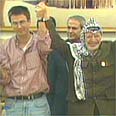
Gordon with Yasser Arafat in 2002
צילום ערוץ 2
Lecturer qualifies his call for ban on Israel
Dr. Neve Gordon says he meant to call for 'graded, sensitive boycott' against Jewish state in LA Times article
Dr. Neve Gordon, who called for an international boycott against Israel in a Los Angeles Times article published Thursday, qualified his statement in an interview with Ynet Sunday.
"The intent was for a graded boycott sensitive to content and circumstances," the Ben-Gurion University lecturer said. "I stress in the article that the boycott should begin with products produced in settlements, and if this doesn't help to move on to companies who blatantly support the settlements."
He added, "I believe that a graded boycott sensitive to content and circumstances will not bring destruction to the state, but will empower it because it will encourage the return of occupied lands and the reaching of a peace agreement with the Palestinians – which will in turn normalize relations with many Arab countries that will change their stance on Israel in the international arena."
Gordon said he believed this was the only way a solution could be reached. "In 1993, when the Oslo Accord was signed, there were 100,000 settlers in the West Bank. Today there are 250,000. So even during times of peace the settlers double their numbers. Only with international pressure can we get out of the (Palestinian) territories," he said.
Ben-Gurion University has rejected the lecturer's views, and on Sunday University President Rivka Carmi published a statement saying she was "appalled at the irresponsible things said by Dr. Gordon, which merit moral condemnation".
She also said Gordon had made "cynical" use of the right to freedom of speech. "Academic employees who feel this way about their country are invited to seek personal and professional sanctuary elsewhere," Carmi's statement says, without defining the measures that would be taken against Gordon by the university.
However the lecturer has received some support from colleagues. Professor Oren Yiftachel told Ynet the university's response was "unfortunate".
"You can disagree with Gordon, but it's his right to express his opinion," Yiftachel said. "He is not speaking for the university, and he is speaking about a field of his expertise."
In his own response to the anger expressed over his article Gordon said Sunday, "I am sure readers would be interested to know that the 1940 statement on academic freedom was one of the main tools used by McCarthyists to fire suspected communist lecturers," he said.
"From the responses to the article it seems most people don't have the courage to discuss the main issues: Is Israel an apartheid state? How can the Israeli-Palestinian conflict be resolved? Is the settlement project good for Israel or will it cause the state's destruction? It's easy to criticize me while evading the tough and important questions."










